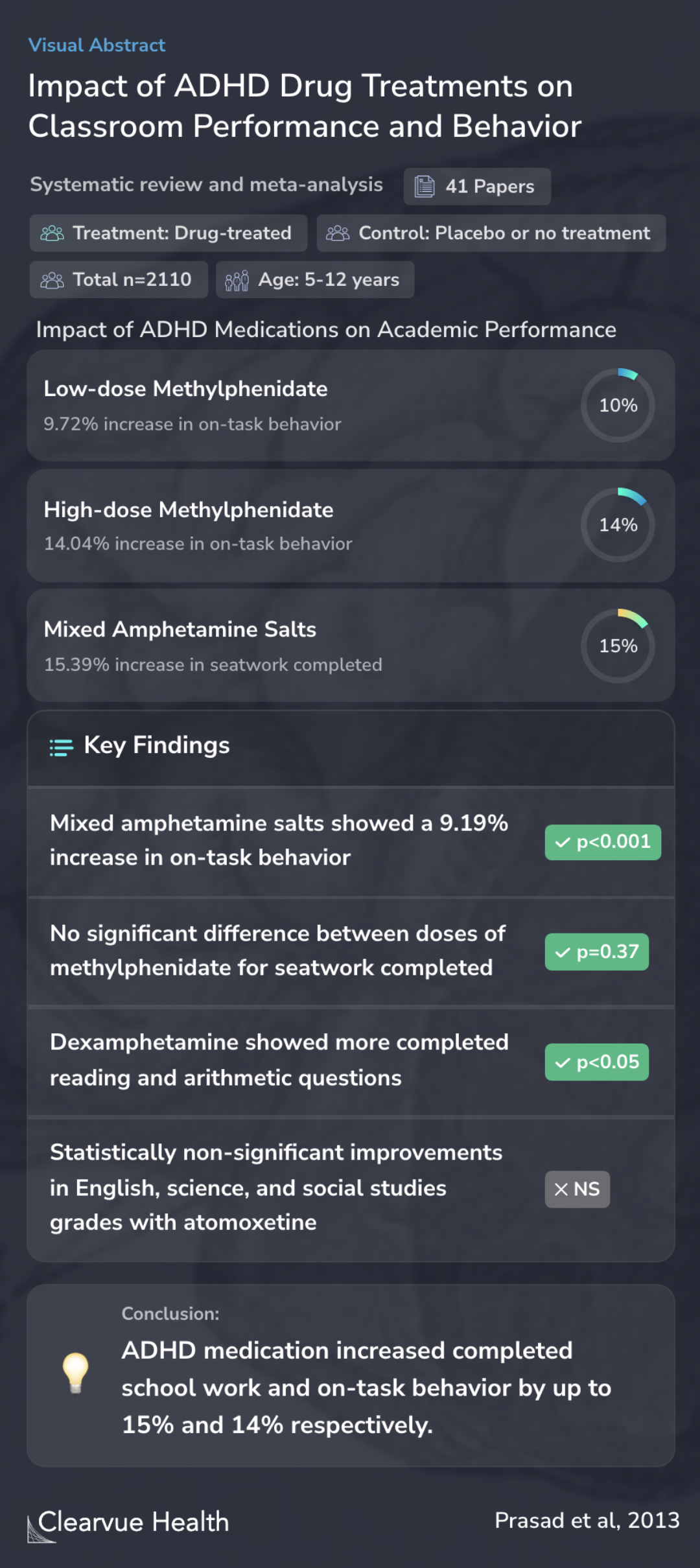How effective are drug treatments for children with ADHD at improving on-task behaviour and academic achievement in the school classroom? A systematic review and meta-analysis
Effectiveness of ADHD Drug Treatments in School Settings
Prasad V, Brogan E, Mulvaney C, Grainge M, Stanton W, Sayal K

Objectives
The paper focuses on how Attention-deficit hyperactivity disorder (ADHD) influences the day-to-day school experience of children. It specifically looks at how different medications—methylphenidate, dexamfetamine, mixed amphetamine salts, and atomoxetine—affect these children's ability to stay on task and their overall academic performance. The study aims to use a meta-analysis, which is a statistical approach to combine results from different studies, to better understand these effects.
Attention-deficit hyperactivity disorder (ADHD) has a significant impact on children's classroom behaviour, daily functioning and experience of school life. However, the effects of drug treatment for ADHD on learning and academic achievement are not fully understood. This review was unde...
Methods
The study involved looking through nine different electronic databases to find trials that compared ADHD medication treatments with no medication, baseline behaviors, or a placebo. These trials specifically reported on how well the children did in school both in terms of their grades and their behavior in the classroom.
Nine electronic databases were systematically searched for randomized controlled trials comparing drug treatment for ADHD against (i) no drug treatment, (ii) baseline (in crossover trials), or (iii) placebo; reporting outcomes encompassing measures of educational achievement within the c...
Results
In total, 43 studies with 2,110 kids were reviewed. These medications generally helped children complete up to 15% more school work and, sometimes, improved how accurately they did tasks like arithmetic. Classroom behavior also got better, with children spending up to 14% more time focused on their tasks. Medications like methylphenidate, dexamfetamine, and mixed amphetamine salts were all beneficial, whereas atomoxetine did not show significant improvements in these studies.
Forty-three studies involving a pooled total of 2,110 participants were identified for inclusion. Drug treatment benefited children in the amount of school work that they completed, by up to 15%, and less consistently improved children's accuracy in specific types of academic assignments...
Evidence Comparison
The study's results show that ADHD medications, specifically stimulants, help increase how much schoolwork children complete and improve their behavior in class. This supports well-known treatment strategies that use both medication and behavior therapy to help kids with ADHD do better in school and daily life. Stimulants, as noted, are typically prescribed to manage ADHD symptoms effectively.
However, atomoxetine, a non-stimulant, was found not to have significant benefits in the studies mentioned. This finding contrasts with evidence for the efficacy of medications for improving on-task behavior and completing schoolwork, thereby underscoring the importance of choosing the right type of medication based on individual responses and clinical evaluations.
Conclusions
Medications for ADHD might help kids learn better and do better in school.
These review findings suggest that medication for ADHD has the potential to improve children's learning and academic achievement.
Key Takeaways
Context
For those curious about alternative ADHD treatments, the article "Does Strattera give you focus?" provides an interesting perspective. It explores the effectiveness of Strattera, a non-stimulant option, and its varied impact on individual focus, offering a different view from the study's findings on atomoxetine. This could be particularly valuable for readers seeking alternatives to stimulant medications.
Additionally, the article "Distractibility in Attention/Deficit/ Hyperactivity Disorder (ADHD): the virtual reality classroom" is another enriching read. It examines how ADHD affects children's ability to manage distractions in a virtual reality setting, comparing it with non-ADHD peers. This research highlights the challenges ADHD children face in typical educational environments, making it relevant for those interested in the practical aspects of managing distractibility in educational settings.